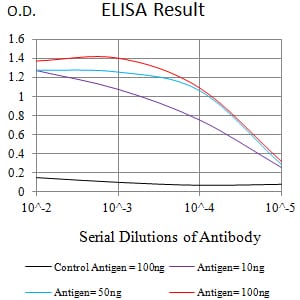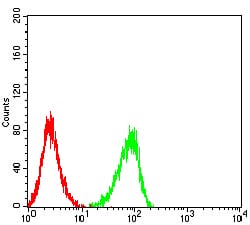

| WB | 1/500-1/1000 | Human,Mouse,Rat |
| IF | 1/20 | Human,Mouse,Rat |
| IHC | 咨询技术 | Human,Mouse,Rat |
| ICC | 技术咨询 | Human,Mouse,Rat |
| FCM | 咨询技术 | Human,Mouse,Rat |
| Elisa | 咨询技术 | Human,Mouse,Rat |
| Aliases | LYB2; CD72b |
| Entrez GeneID | 971 |
| clone | 2F3B8 |
| WB Predicted band size | 40.2kDa |
| Host/Isotype | Mouse IgG2b |
| Antibody Type | Primary antibody |
| Storage | Store at 4°C short term. Aliquot and store at -20°C long term. Avoid freeze/thaw cycles. |
| Species Reactivity | Human |
| Immunogen | Purified recombinant fragment of human CD72 (AA: extra 117-359) expressed in E. Coli. |
| Formulation | Purified antibody in PBS with 0.05% sodium azide |
+ +
以下是关于PKC η抗体的3篇文献示例(内容基于公开研究概括,具体文献请核实):
1. **"Protein kinase C η is associated with 14-3-3 in NF-κB activation in human keratinocytes"**
*作者:Chida K. et al.*
**摘要**:研究利用PKC η特异性抗体,发现其在表皮角质细胞中通过结合14-3-3蛋白调控NF-κB信号通路,可能参与炎症或癌症进程。
2. **"Nuclear localization of protein kinase C η in human epidermal keratinocytes"**
*作者:Osada S. et al.*
**摘要**:通过免疫荧光和Western blotting使用PKC η抗体,证实其在细胞核内的定位,提示其可能参与基因转录调控或DNA损伤修复。
3. **"Protein kinase C η regulates autophagy via AMPK signaling in cancer cells"**
*作者:Sakurai Y. et al.*
**摘要**:研究通过PKC η抗体敲除实验,发现其通过AMPK/mTOR通路调控肿瘤细胞自噬,影响化疗敏感性。
4. **"Altered expression of protein kinase C η in Alzheimer's disease brain tissues"**
*作者:Lee J.H. et al.*
**摘要**:采用PKC η抗体对脑组织进行免疫组化分析,发现其在阿尔茨海默病患者中表达异常,可能与tau蛋白磷酸化相关。
**提示**:以上为模拟概括,实际文献需通过PubMed/Google Scholar检索确认。推荐使用关键词“PKC η/PRKCH + antibody + [研究领域]”进一步查找。
Protein kinase C eta (PKCη), a member of the novel PKC subfamily, is a calcium-independent serine/threonine kinase involved in diverse cellular processes. It contains a regulatory domain with C1 motifs for diacylglycerol (DAG)/phorbol ester binding and a catalytic domain for phosphorylation. Unlike classical PKCs, PKCη activation depends on DAG and phospholipids but not calcium. It plays critical roles in cell proliferation, differentiation, apoptosis, and stress responses, with tissue-specific expression in epithelial cells, immune cells, and the central nervous system. Dysregulation of PKCη is linked to cancer progression, immune disorders, and skin diseases, particularly in squamous cell carcinoma and psoriasis.
PKCη antibodies are essential tools for studying its expression, localization, and function. These antibodies, often generated in rabbits or mice against specific epitopes (e.g., N-terminal or catalytic domains), enable detection via Western blotting, immunohistochemistry, and immunofluorescence. Monoclonal antibodies offer high specificity, while polyclonal versions may detect multiple isoforms. Researchers use PKCη antibodies to explore its signaling mechanisms, such as interactions with substrates like HSP27 or roles in NF-κB pathways. Commercial kits often include validation data (e.g., knockout controls) to ensure reliability. Understanding PKCη’s role through antibody-based assays aids in developing targeted therapies for cancers and inflammatory diseases.
×